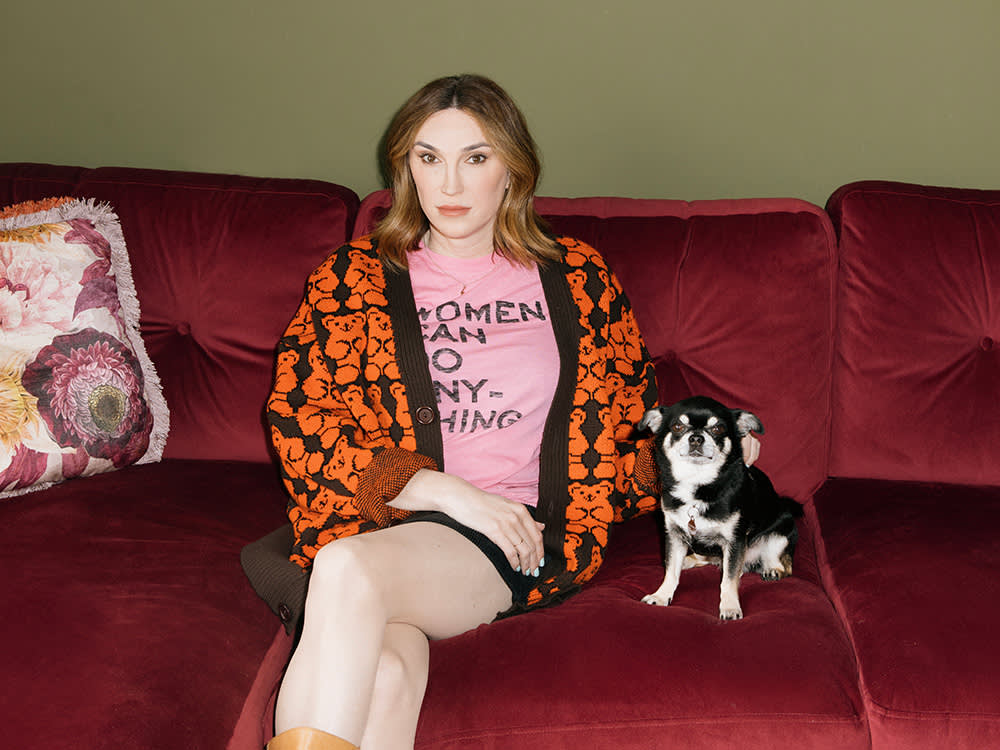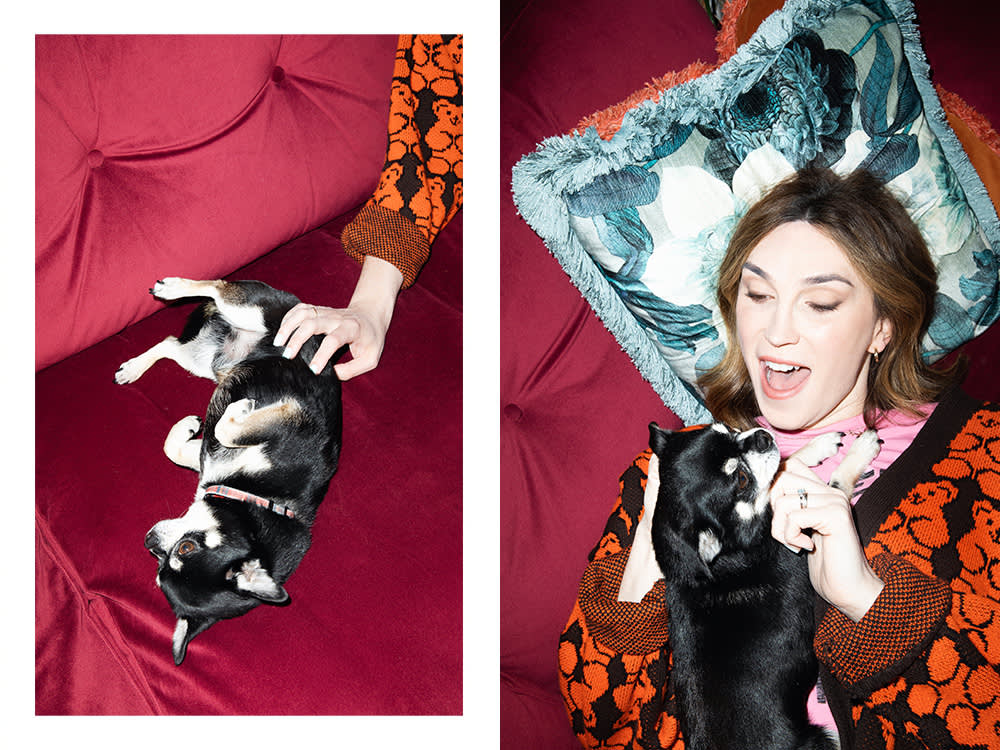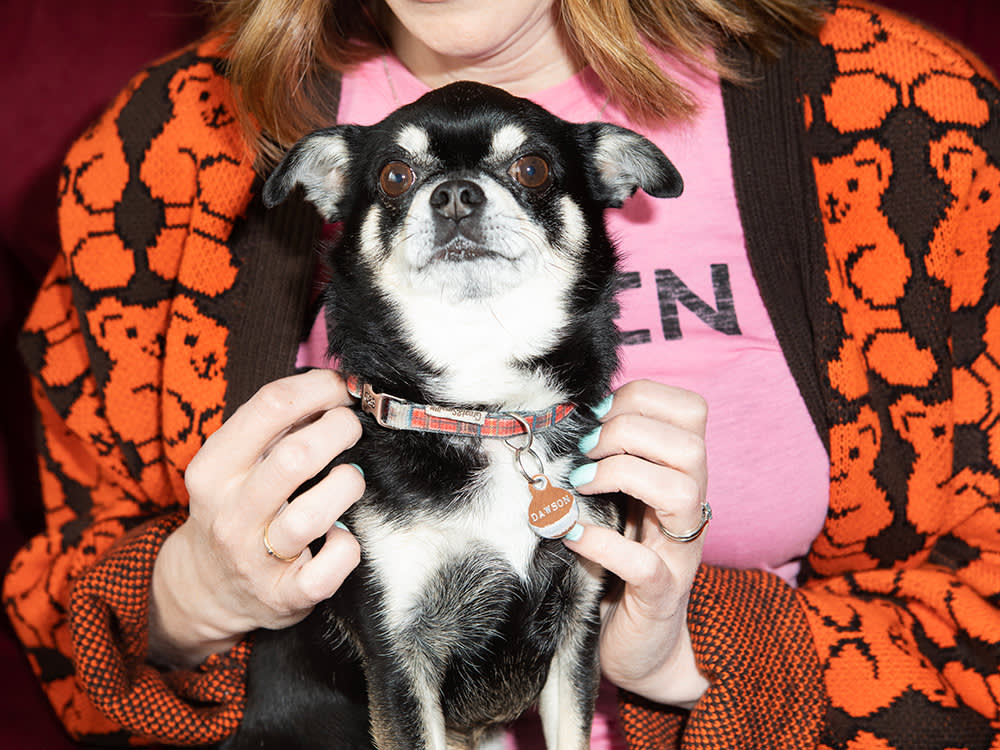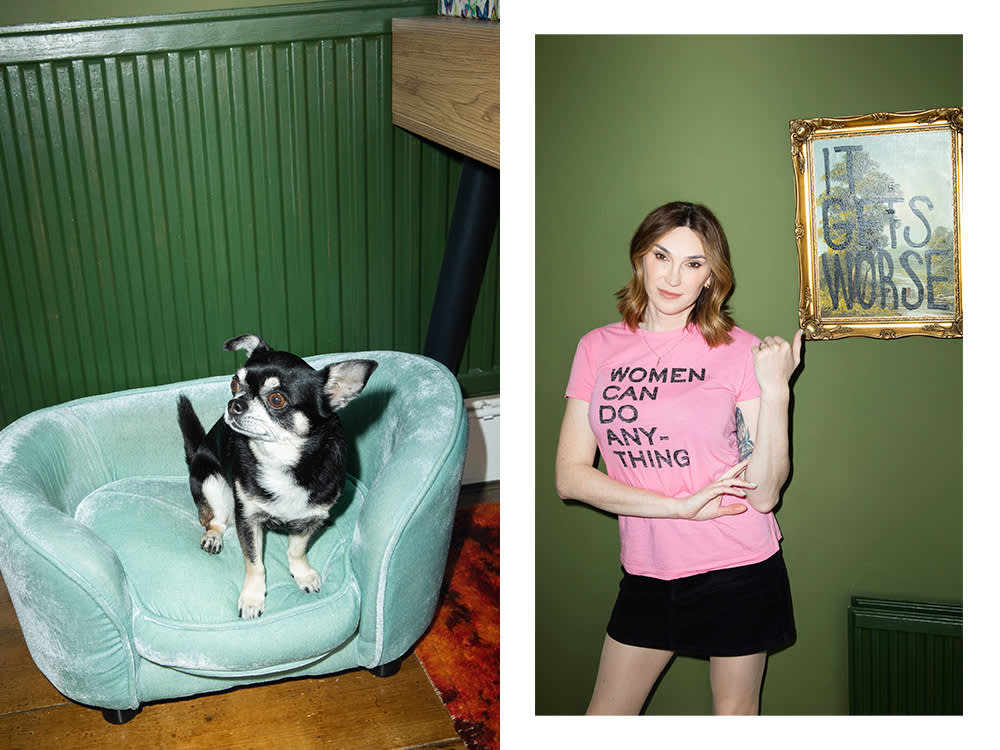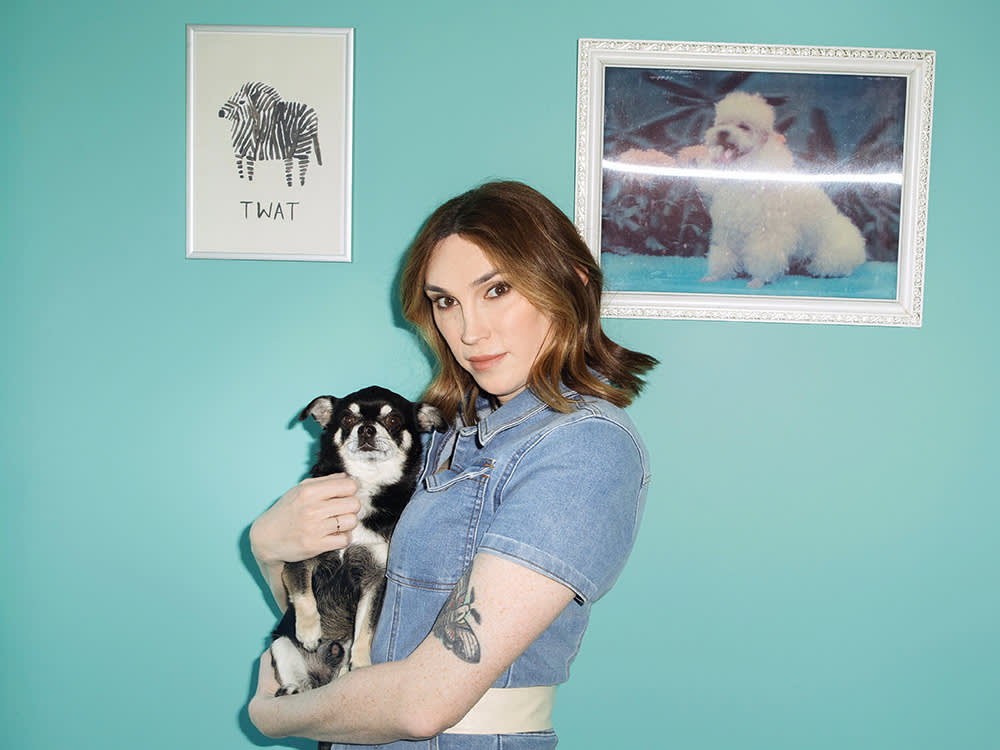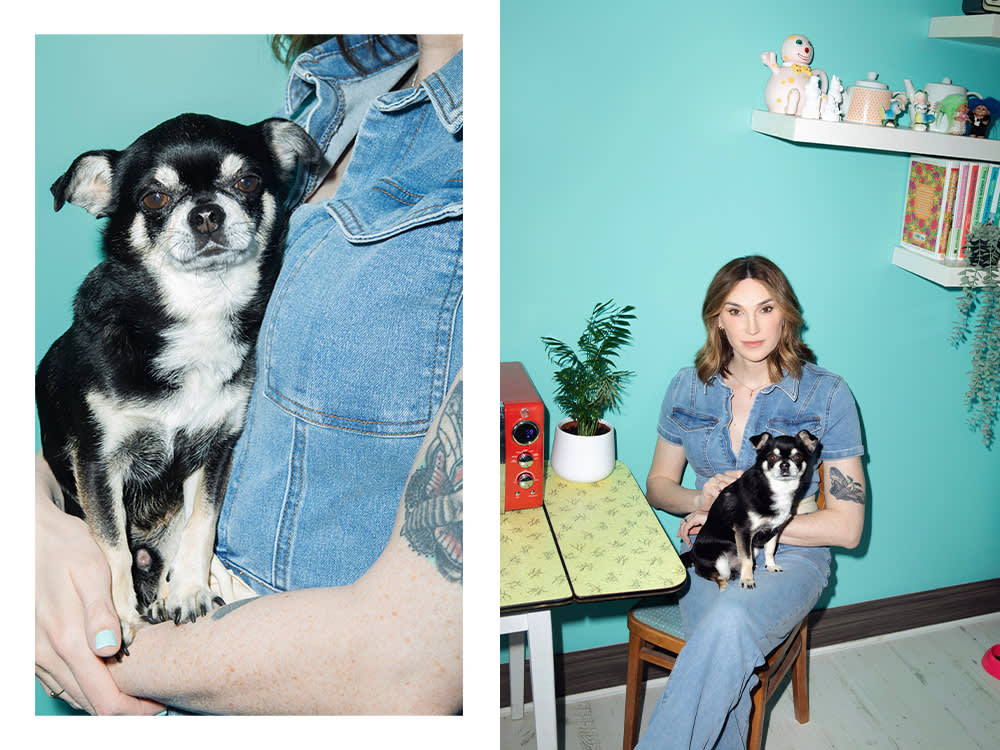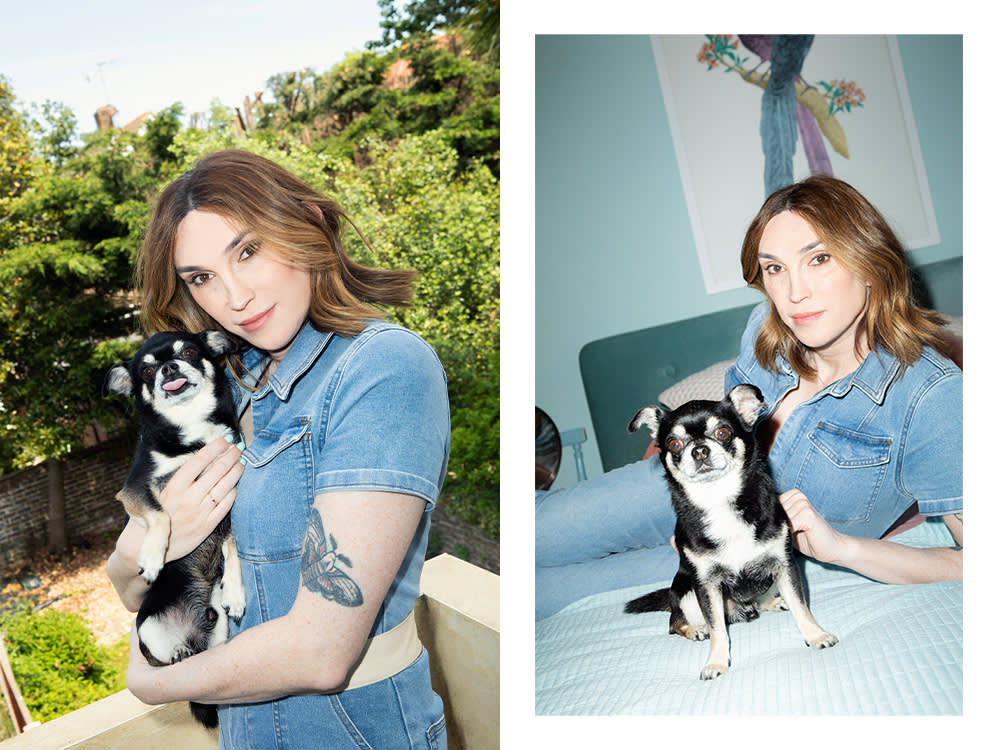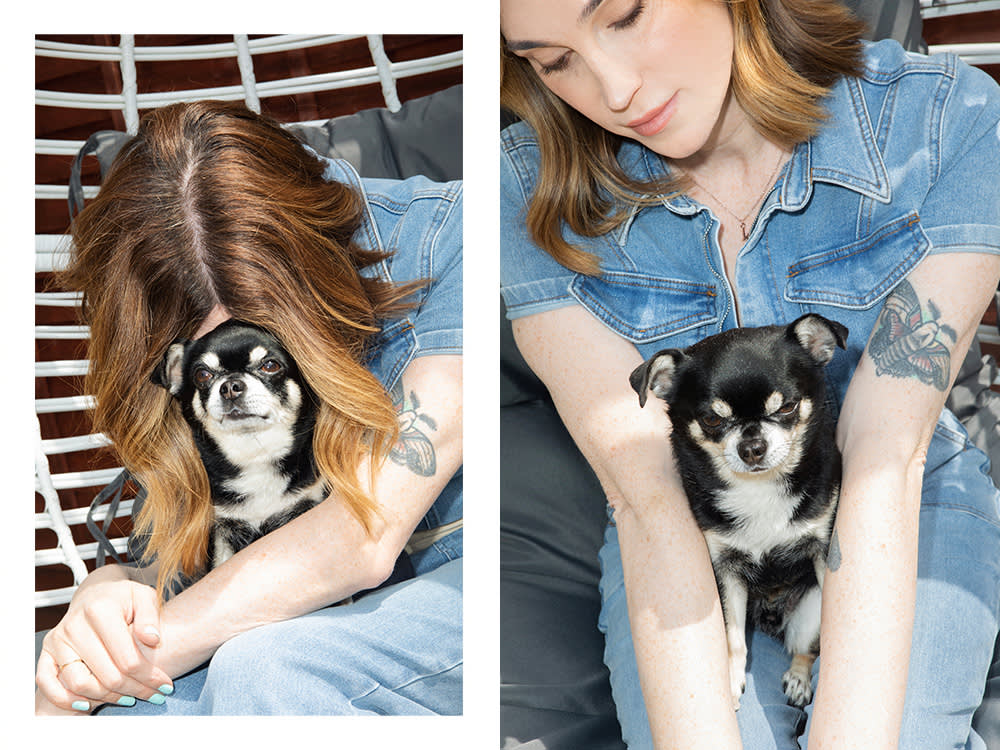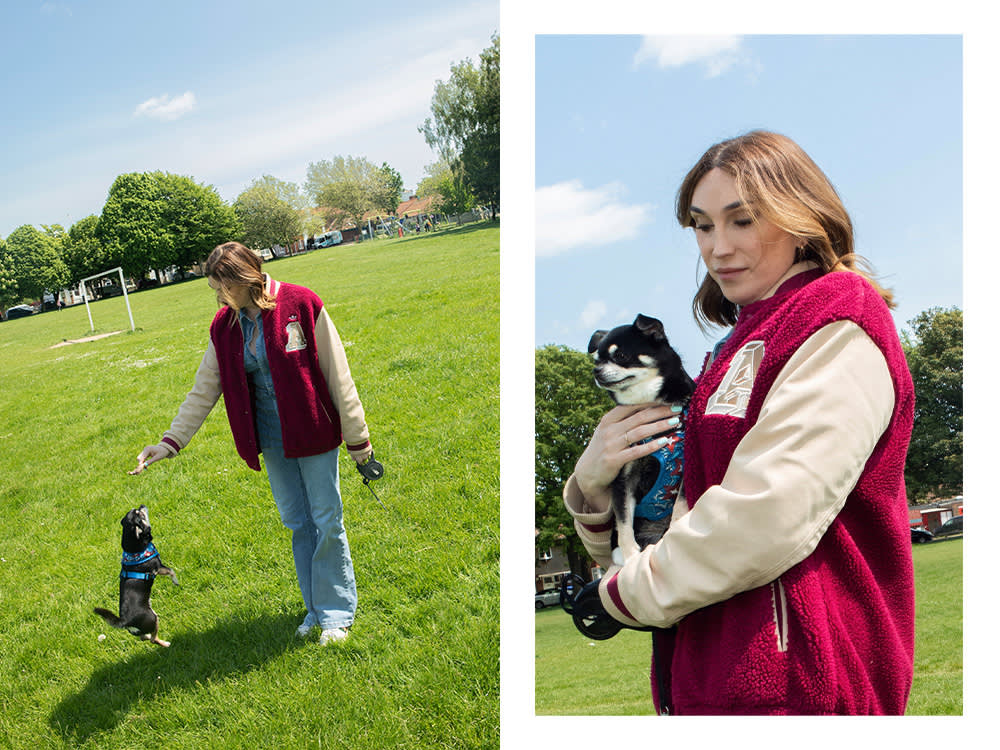Juno Dawson and Her Dog Prince Think You Need to Chill
The author of the ninth-most banned book in the US finds joy in creating queer art and basking in the unconditional love of her Chihuahua
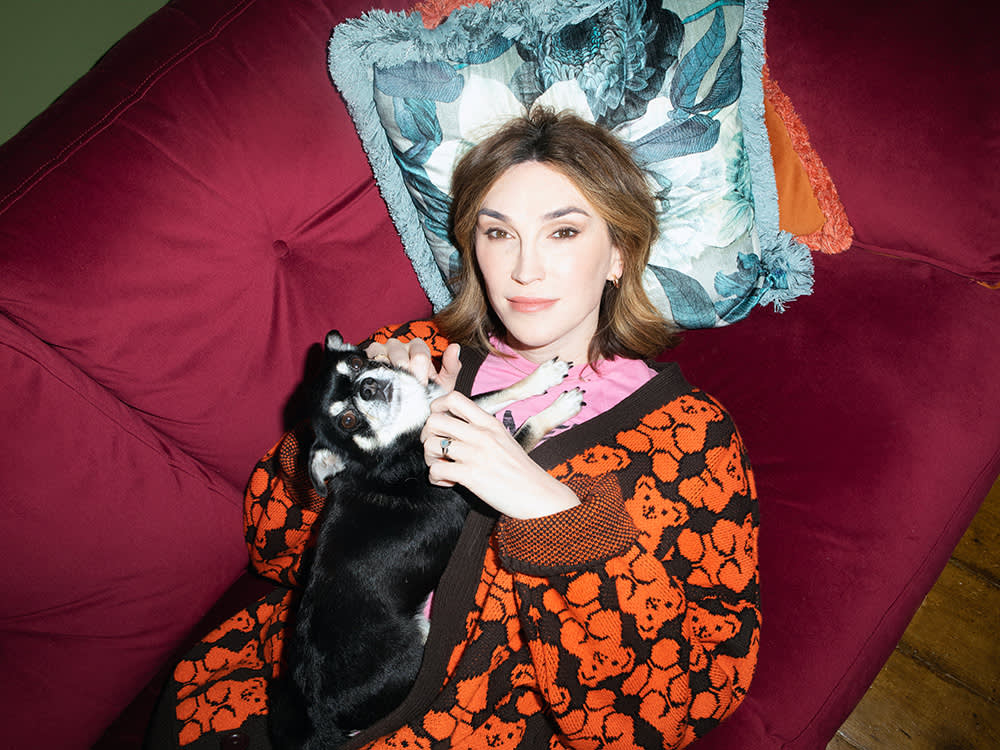
Share Article
Juno Dawsonopens in new tab was working as a school teacher when she was confronted by a huge gap in young people’s education – one she’d already experienced firsthand in her childhood in Bingley, England: LGBTQIA+ kids were being left out to dry. A few years later, after she’d left teaching to pursue a writing careeropens in new tab full-time, her editor suggested she write about sex and relationship education, and she realised she could help teach queer and trans students the life-saving lessons they weren’t necessarily getting in school. The resulting book, This Book Is Gayopens in new tab, went on to become a massive hit, described by Publishers Weeklyopens in new tab as an “irreverent, informative handbook” and assigned in countless sex-ed classes. Juno won the 2014 Queen of Teen opens in new tab award for This Book Is Gay’s impact.
But not everyone has been happy to see This Book Is Gay make its way into classrooms. Years after the book’s publication, Juno found herself the subject of fresh controversy as conservative effortsopens in new tab in the United States to remove LGBTQIA+ representation and sexual health education have escalated. According to Vanderbilt Universityopens in new tab, This Book Is Gay is now the ninth-most banned book in the US.
All the senseless negativity has done nothing to slow Juno down; in fact, it only strengthened her awareness that what she’s doing matters. In 2017, she published her first book aimed toward an adult audience, The Gender Gamesopens in new tab, a memoir about her experiences living as a transgender woman. In 2021, she published What's the T?: The No-Nonsense Guide to All Things Trans and/or Non-Binary for Teensopens in new tab. Juno’s latest book, You Need to Chillopens in new tab, is aimed at her youngest audience yet: the short, rhyming picture book tells the story of a child explaining her sibling’s transition to their classmates.

Get (totally free) deals for food, treats, accessories, tech and way more pet parenting must-haves.
When she’s not publishing bestseller after bestseller, Juno is investing in other important art. In her hometown of Brighton, which she describes as a kind of “safe haven” for queer people, Juno performs with Club Silencioopens in new tab, a queer cabaret show that answers pressing questions like, “What if Dorothy had to return to Ozopens in new tab 20 years later to satisfy her book agent’s sequel request?”
A School Role Model opens in new tab for the Stonewall charity, Juno is committed to showing kids that a happy life as a trans person is possible. And by her side throughout it all is Prince, her nine-year-old shockingly chill Chihuahua. Prince came into Juno’s life just before she started her gender transition, and she describes adopting Prince and beginning hormones as similarly nerve-wracking but overwhelmingly worthwhile decisions.
Kinship caught up with Juno to talk about falling head-over-heels for Prince, making art that elevates LGBTQIA+ voices and celebrates queer joy, and creating You Need to Chill, a delightful must-read for the kids in our lives.
Tell me about Prince. How did he come into your life?
Prince came about in 2014. I had been mulling the idea of getting a dog for a while. I had turned 30, and I felt it was kind of weird that a queer person can get into their early thirties without having any sort of responsibility in their life. In a previous life, I had been a primary school teacher, which is obviously a job that comes with huge responsibility, but since going freelance to be a full-time writer, I almost felt too free.
I could kind of go out for days on end, I could stay out all night, and nobody was really worried about where I was. I was like: “That’s almost quite sad; you haven’t really put down any roots, you don’t own a property, you don’t have a car.“ I felt like it was time to grow up a bit, and I felt that a dog is perhaps more responsibility than a cat or a goldfish.
How did you decide you wanted a Chihuahua?
I’m gonna shout-out to my friend and colleague Alex T Smith, who is an amazing author and illustrator, famous for the Claude seriesopens in new tab, which is about a little dog. He’d had Chihuahuas, and I’d always seen myself with one. I knew I wanted a toy breed because I find them endlessly amusing. And also we lived in a three-bedroom flat in London, so it wouldn’t have been right to get an enormous German Shepherd or something.
What’s his personality like?
When I first met him, his brother kind of came running up to me, kind of launched himself and was very licky and wanted lots of attention. Then there was this other one, this little gormless thing kind of sat in the back. And I was like, “Oh, I want the little gormless one,” because he looked so chill. I think Prince was possibly the runt of the litter as well; he was smaller and a bit out of it – honestly, he was a bit stoned, I think. I picked him up and gave him a cuddle, and I just felt that he was for me. And it was my first dog, so I thought, “Well, maybe if this one is a bit more placid that might be a sensible thing to do.”
Those feel like good signs he was the perfect dog for you
However, obviously, he was still a puppy. The first six months were one of the most challenging periods. Nobody really warns you about how challenging a puppy is. It’s that awful sense of, if you don’t have eyes on them, they’re doing something wrong. Something is being peed on, something is being chewed.
But still, when people meet Prince now, nine years on, they still think, “Gosh, he’s very chill for a Chihuahua.” And he is. He’s very territorial of our home, but I think it might be a bit too late to do anything about that.
You’ve written and spoken about This Book Is Gay being the ninth-most banned book in the US. Your new book, You Need to Chill, is another children’s book and your first picture book. Why do you think it’s important to explore LGBTQIA+ themes in children’s literature?
I used to be a primary school teacher. I worked mostly with 10- and 11-year-olds. And initially, I got my first book deal for fiction, my editor was just like, “Oh hang on, we’d really love you to do some books about SRE, sex and relationship education. How would you feel about that?” Because I was kind of broke, and I’d left teaching to write full-time, I was like, “Oh, of course I’ll do it.” That’s kind of how This Book Is Gay came about.
I knew from my teaching years that sex and relationship education for LGBTQIA+ people just didn’t exist; it just wasn’t there. It was only in 2003 in the UK that teachers were even allowed to talk about LGBTQIA+ issues in school. So, I thought, “Maybe there’s an opportunity there to do something informative that’s also kind of funny.“ And I knew it had to address the time we were in... we’re in the internet time, and adolescents did have access to all kinds of crap online that we just didn’t when I was in school. So, I wanted to talk about online safety as well. I guess it was everything I wish I’d known when I was 14.
You mentioned teachers being banned from speaking about LGBTQIA+ issues in schools until 2003. In the US, some states are rolling back those protections – like in the case of Florida’s “Don’t Say Gay” bill. Why is it especially important to create and protect these kinds of books now?
I think on both sides of the Atlantic we’re looking at what is being called “the culture war.” I think there are bad actors, there are right-wing politicians who haven’t got anything to celebrate. You know? Trump didn’t really achieve anything in power, the Conservatives in the UK have been in power for a really long time, and the country has gotten materially worse, we’re in a cost-of-living crisis, Brexit was a disaster that no politician is allowed to talk about. So, what can you talk about?
Well, you can talk about a book. Or you can talk about trans healthcare. Or you can talk about a drag queen. You know, this is scapegoating 101. It’s a witch hunt, it’s Jaida Essence Hall “Look over there!opens in new tab” – it’s a distraction. It’s a distraction from their failures, and I think they do a disservice to their voters because I don’t think anyone in either the UK or the US can really think that trans kids or drag queens are the true menace in our society. You know, it’s guns, it’s war; there are real, serious systemic issues in both countries, and it’s not drag queens.
So, how did you decide to deal with that?
During the pandemic, I felt so disenfranchised. I felt powerless. And it was really shocking to me that during the pandemic in particular, transphobia in the UK just got worse and worse and worse. There’s a real sort of legitimisation of transphobia in the press in the UK that was incredibly scary and toxic. And I was like, “Look, I can’t change this. I don’t have any power in the media. But I am a well-respected children’s writer. That’s the one thing I can do.“ And that’s where What’s the T? and You Need to Chill came from. I was like, “I can’t do much, but I can do this one thing and I can do it really well.” So it’s a contribution, I suppose.
It’s such a necessary contribution. Speaking of scapegoating, trans kids, in particular, are being used as political tools to pass all this anti-trans legislation. Politicians are positioning it as, “We need to protect children from being taken advantage of by trans people.” What are your thoughts about that?
I find that just incredibly hypocritical. For one thing, I was surrounded by books as a child, and they all featured straight, cisgender people, and that didn’t keep me safe. It kept me ignorant, and it kept me unprepared. So, when I left school, and when I left home when I was 18, I was so unschooled and so unprepared for adult life that I was vulnerable. I was taken advantage of; I put myself in some incredibly unsafe and dangerous situations. And if I had an LGBTQIA+ elder say to me, either in-person, or online, or in the form of a book, “Look, you need to be careful, there’s this thing called Grindr, there are people who will take advantage of you, this is how you protect yourself, this is how you stay safe,” that would have made a big difference in my life.
In the midst of controversy and living life as a public figure, how has Prince been as emotional support?
Oh, he’s amazing. The best thing about having a dog is there’s something just kind of uncomplicated about a dog’s love. They just really love you. And it’s really mutual. I think before I got Prince I didn’t really know how much I was capable of love. And now there’s this little thing in the world who needs me. That’s a lot of responsibility. And now he’s getting older, I start to think about what life will be like without him, and it’s almost too sad to think about. It feels quite cruel. It doesn’t feel like nine years; it still feels like he’s my new dog.
You got Prince right before you transitioned. What has it been like having Prince by your side through so many life changes?
I did worry initially that I might smell different, or he wouldn’t know who I was or something. Luckily, that has not been an issue. It’s been fine. He’s good. He still understands I am his primary caregiver, and he always did. It’s funny; that last year before I started my transition, I was already in therapy and speaking with a therapist about potentially transitioning, and I think Prince was one of the things I did that was kind of like, “Well, maybe if you do this, it’ll take your mind off transitioning or you could do this instead of transitioning.“ Like, I got a bunch of tattoos as well. But you sort of think, actually in the end, this isn’t going to go away – you have to address this.
Does Prince come with you on book tours?
No. That would be so good. He’s never been on a plane, and now’s not the time to start now that he has a heart murmur. I’m very lucky that my husband is amazing, but also if I go away for extended periods, Prince stays with my friends who’ve got two kids, so it’s almost like he’s got two homes. Especially before I met my husband, that was such a big help to have this family who were just willing to have my dog whenever I needed to go away with work.
Where do you find queer joy locally?
Club Silencio – we call it a cabaret, which I think is a very loose definition – that is something that brings me great joy. I love that I have this creative thing I do that has nothing to do with my career but still brings me a lot of joy.
I live right outside Brighton, which is one of the queerest places in the UK. There was a point last year when things got really bad on TERF Islandopens in new tab, and I thought maybe it’s time to leave. Maybe I’ll go to Spain, maybe Ireland, maybe even look farther afield to Australia or New Zealand. And I realised I almost live in a safe haven. Yes, my country is in a mess, but actually Brighton kind of looks after itself. There is a kindness.
My friend and I decided both politically and community-wise it’s better to really focus our efforts on grassroots local organisations. So, last year, we revived Club Silencio to raise money for Trans Prideopens in new tab, which is a local organisation. It’s again about trying to find your power. Like, I cannot single-handedly bring down a right-wing government, but I can put on a queer show that raises money for a trans organisation. Or I can volunteer and do small things to make political change come around, which it always does. It always does.

Sio Hornbuckle
Sio Hornbuckle is a writer living in New York City with their cat, Toni Collette.
